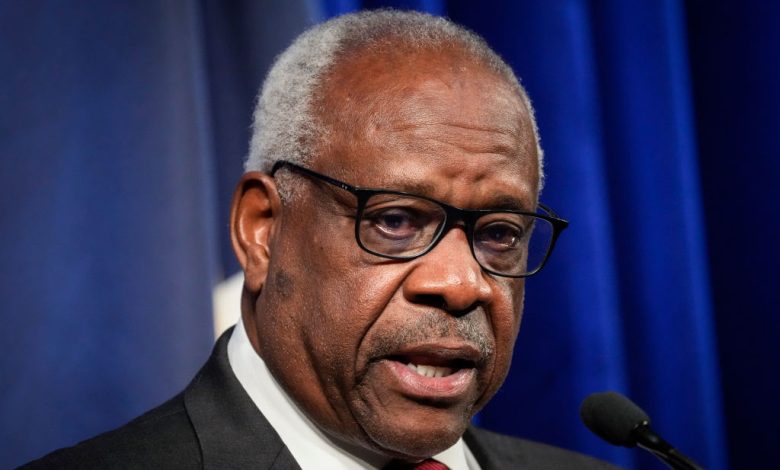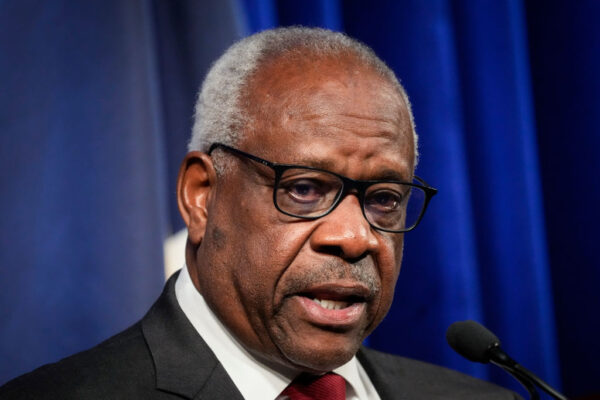Why the Latest Voice In the Chorus of Demands for Clarence Thomas to Step Down Could be a Sign of Trouble for the Supreme Court Justice

While Supreme Court Justice Clarence Thomas seemingly fended off criticism for the luxury trips he took on the dime of a megadonor and his wife’s campaign to overturn an election that he weighed in on from the judicial bench, one U.S. senator has put his feet to the fire, possibly creating a gateway for a deeper look at Thomas’ ethics standards.
U.S. Sen. Ed Markey of Massachusetts called for Thomas to resign on Tuesday, April 25, echoing the demands of critics who say the justice is no longer fit to serve on the country’s highest court because of questions of partiality.
“I will say what needs to be said, Clarence Thomas needs to resign from the Supreme Court of the United States,” said Markey during a news conference. “His reputation is unsalvageable. It is evident that he cannot judge right from wrong, so why should he be judging the country’s most important cases on its highest court?”

Thomas’ ethics initially came into question in March 2022 when his wife, Virginia “Ginni” Thomas admitted she attended the Jan. 6 rally that led to the diabolical riot at the nation’s Capitol.
It was later revealed that she took her campaign against President Joe Biden’s election further by sending at least 29 texts to the former president’s Chief of Staff Mark Meadows pushing him to be more militant in fueling claims of election fraud.
While Ginni has said that she and her husband don’t share the same opinions and ideas, Thomas was the only justice who voted to prevent the Jan. 6 committee from obtaining White House records related to the riot.
The texts revealed during a committee hearing caused an uproar over his apparent conflicts of interest to rise, but it quickly faded. It resurfaced recently when his close relationship with Harlan Crow was revealed.
An April 6 report by ProPublica found that Thomas and his wife had taken trips in the billionaire Republican’s private jet and luxury yacht over the last 20 years — excursions worth hundreds of thousands of dollars — without reporting them.
Those revelations raised questions about Thomas’ part in reversing a lower court’s conviction of former Virginia Gov. Bob McDonnell in 2016.
McDonnell was accused of accepting more than $175,000 in kickbacks from a businessman. The Supreme Court ruled the state was unable to prove that McDonnell’s favors for the businessman were “official acts.”
Markey is the first member of Congress that has called for Thomas’ resignation since word of the gifts broke. However, the associate justice who has been on the bench for more than 31 years has shown no sign he’s considering stepping down.
Thomas said he and Ginni were merely joining Crow and his wife on numerous family trips as friends often do, and he had consulted with “colleagues and others in the judiciary” who said, “personal hospitality from close personal friends, who did not have business before the Court, was not reportable.”
“I have endeavored to follow that counsel throughout my tenure, and have always sought to comply with the disclosure guidelines,” he said in an April 7 statement, also acknowledging that the guidance for reporting has changed in the past month.
“And, it is, of course, my intent to follow this guidance in the future,” Thomas said.
Crow said they never discussed court proceedings while they vacationed like Ginni said she and her husband had an “ironclad” rule not to discuss open cases.
Still, reports revealed that a subsidiary of Crow’s company, Trammell Crow Residential Company had a case on the docket in 2005. The court declined to hear the case over architectural rendering copyrights, and Crow had no controlling interest at the time. However, Crow was the CEO and chair of the board for the architecture company Metric Holdings Limited Partnership when an appeal was filed, according to reports.
Although Thomas may not go willingly, he can be removed by impeachment if federal lawmakers find that he has violated ethics laws. Democrats like Markey currently hold a majority in the Senate, while Republicans hold the advantage in the House, where the impeachment must clear first.
The Constitution calls for impeachment by the House and conviction by the Senate when there is proof of ‘‘treason, bribery, or other high crimes and misdemeanors.’’
It further states that judges of the supreme and inferior courts ‘‘shall hold their offices during good” behavior.
Justice Samuel Chase was the only justice to be impeached by the House of Representatives in 1805, but he was acquitted by the Senate.
In 1969, facing the threat of impeachment Justice Abe Fortas resigned from the bench over concerns about a deal he brokered with a former client, a Wall Street financier who ran into criminal problems. Fortas was to receive $20,000 a year for life as a retainer for his advice.
Thomas is not the only Supreme Court justice raising questions about ethics standards. Politico reported on Tuesday that Justice Neil Gorsuch failed to properly report a real estate sale to the CEO of a law firm with 22 cases before the court.
In a letter signed by all nine of the justices on Tuesday, Chief Justice John Roberts declined an invitation from the Senate Judiciary Committee to speak to the congressional panel about the court’s ethics practices.
“Testimony before the Senate Judiciary Committee by the Chief Justice of the United States is exceedingly rare as one might expect in light of separation of powers concerns and the importance of preserving judicial independence,” Roberts wrote, attaching the “Statement of Ethics Principles and Practices” which he said “all of the current Members of the Supreme Court subscribe,” without further explanation.




